| Pages:
1
..
26
27
28
29
30
..
77 |
Hawkguy
Hazard to Others
  
Posts: 326
Registered: 10-10-2014
Location: British Columbia (Canada eh!)
Member Is Offline
Mood: Body is Ready
|
|
Quote: Originally posted by Molecular Manipulations  | Nice TheAustralianScientist, looks to me like the ash and dust in a nuclear mushroom cloud! When I do the silver tree I use a less
concentrated solution of silver nitrate (about 0.1 molar) and it makes larger crystals which reflect more light.
How'd you condense the chlorine Hawkguy? I've used dry ice in acetone with some success for that in the past. Don't use styrofoam
Hehe.
[Edited on 9-2-2015 by Molecular Manipulations] |
I used the dry ice freezing mixture too, but I'm trying to adapt it to used propane or butane evaporation... Much more OTC..
|
|
|
quantumcorespacealchemyst
Banned Shitposter
Posts: 213
Registered: 17-10-2014
Member Is Offline
Mood: No Mood
|
|
Does anyone know what the possible reactions going on in the arsenic ore dissolution are?
The Realgar As4s4 and Orpiment As2S3 seem to be the main parts of some ore, where AsO3 and even elemental Arsenic seem to be in other types.
I don't know about the pentoxide or supposed Arsenic dioxide, which Wikipedia says is a mixed valent compound of AS(iii) and AS(v).
Does HCl displace Sulphur? Can NO3 make nitrates? There doesn't seem to be much Arsenic chemistry here. I may have not found it yet. Nonetheless, the
chemical working of Arsenic seems to be tough to find out about (besides analysis, Marsh test stuff).
|
|
|
woelen
Super Administrator
        
Posts: 8082
Registered: 20-8-2005
Location: Netherlands
Member Is Offline
Mood: interested
|
|
There is a good reason for the low abundance of arsenic chemistry on this site. It is way too toxic to do anything more than the most basic things.
Heating it, bubbling gas through arsenic-containing solutions, reducing it with strong reductors, they all are a no-go if you value your health. It is
surprising that arsenic-containing chemicals can be obtained so easily (especially As4S4 and As2S3), but to a lesser extent also FeSAs.
|
|
|
Sulaiman
International Hazard
    
Posts: 3780
Registered: 8-2-2015
Member Is Offline
|
|
I made a video of tin crystals growing by electrolysis in real time,
I think it's pretty. https://www.youtube.com/watch?v=G1sq4hnrBgM
(I don't know how to copy it here)
After the video I just put the tin and electrolyte (HCl + SnCl2) in a beaker,
and stirred it to remake tin chloride ready for another run.
If not for the HCl it could make a nice re-usable toy.
[Edited on 12-2-2015 by Sulaiman]
|
|
|
morganbw
National Hazard
   
Posts: 561
Registered: 23-11-2014
Member Is Offline
Mood: No Mood
|
|
@Sulaiman
I liked that
|
|
|
quantumcorespacealchemyst
Banned Shitposter
Posts: 213
Registered: 17-10-2014
Member Is Offline
Mood: No Mood
|
|
arsenic is only dangerous if the reactions and behaviour are unknown. chemistry at it's core deals with dangerous materials in a safe manner. lack of
information is the real danger.
|
|
|
fluorescence
Hazard to Others
  
Posts: 285
Registered: 11-11-2013
Member Is Offline
Mood: So cold outside
|
|
The question is what you want to do with it. I only made the Arsenic Acid because I always wanted to have that particular compound. There is a quite
large variety of Arsenic Salts but I don't really know what to do with them. Your Sulfides belong to the few one that are even colored. So I'd rather
keep them as they are...
I have some Sodium Arsenide and Arsenate but they just stand around as white powders and don't have any use for me. I worked with Arsenic at the
university last semester where I had to find out whether it was in a given sample. So I did some testing with the Arsenic Compounds we had in our
university lab. There are some interesting reactions with arsenic. There was a really efficient way to reduce it to the metal with the help of KCN
that ended with a black sponge of metal in my testtube - I even managed to get an Arsenic mirror on the walls but that's pretty much all of it.
And I also have some bad memories on arsenic. A collegue gave me some testtubes to clean since I was cleaning mine and didn't tell me what was in it.
Unfortunately it was conc. Sulphuric Acid with Arsenic(III)oxide in it. If he told me that there was acid in it I wouldn't have added water to it. The
next thing I felt was boiling arsenic contaminated sulphuric acid running over my hand immediately leaving a red trail where it went.
Took like 3 weeks to fully heal. So I'm not really a fan of Aernic either.
Not because of it's toxicity but rather because of it's uses.
To add something to the thread: Here is some Cobalt(II)chloride (waterfree) dissolved in some absolute Ethanol. If you don't have water
in it you get a blue solution in stead of a pink one. Tried it with Nickel(II)chloride, too. This will leave you with a yellow solution but it's not
that good.
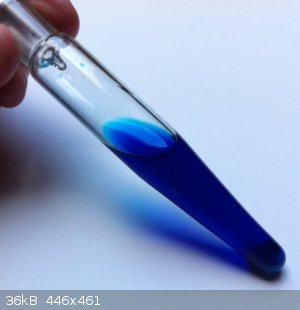
|
|
|
quantumcorespacealchemyst
Banned Shitposter
Posts: 213
Registered: 17-10-2014
Member Is Offline
Mood: No Mood
|
|
i worked out a theoretical equation of the action of nitric and hydrochloric acid on As4S4, realgar.
4HNO3 + As4S4 ---> 4HAsO + 4S + 4NO2
4HNO3 + As4S4 + 8HCl ---> 4HAsCl2 + 4S + 4NO2 + 4H2O
i don't know if that is likely to occur, the second equation mostly.
i guessed that Cl- is more attracted to the molecule (if it exists), being more basic than O-2, which seems to be more acidic and displaced easier.
i have seen a picture http://www.mindat.org/min-2328.html of a sulphur/selenium containing mineral, looks amazing.
and take a look at this (if you will), it looks like fiber optic cables http://www.mindat.org/min-4232.html.
edit: wrong link,fixed, also it doesn't seem HAsO and HAsCl2 are likely to form/exist.
Yvonite Cu(HAsO4) · 2H2O
http://www.mindat.org/min-7382.html
[Edited on 12-2-2015 by quantumcorespacealchemyst]
|
|
|
quantumcorespacealchemyst
Banned Shitposter
Posts: 213
Registered: 17-10-2014
Member Is Offline
Mood: No Mood
|
|
www.mindat.org/min-4195.html
http://www.mindat.org/min-39333.html
http://www.mindat.org/min-3503.html
http://www.mindat.org/min-240.html
[Edited on 12-2-2015 by quantumcorespacealchemyst]
|
|
|
j_sum1
Administrator
       
Posts: 6374
Registered: 4-10-2014
Location: At home
Member Is Offline
Mood: Most of the ducks are in a row
|
|
Quote: Originally posted by Sulaiman  | I made a video of tin crystals growing by electrolysis in real time,
I think it's pretty. https://www.youtube.com/watch?v=G1sq4hnrBgM
(I don't know how to copy it here)
After the video I just put the tin and electrolyte (HCl + SnCl2) in a beaker,
and stirred it to remake tin chloride ready for another run.
If not for the HCl it could make a nice re-usable toy.
[Edited on 12-2-2015 by Sulaiman] |
That is AWESOME.
I now know how I am going to show tin in my element display.
J.
|
|
|
mayko
International Hazard
    
Posts: 1218
Registered: 17-1-2013
Location: Carrboro, NC
Member Is Offline
Mood: anomalous (Euclid class)
|
|
I recently made some iodine monochloride; here's some pictures from that ... adventure ... as the trichloride began to form and solidify. The last one
is ~800x taken through the glass with a USB microscope. I kept thinking how the flask looked like a gas giant like Jupiter:
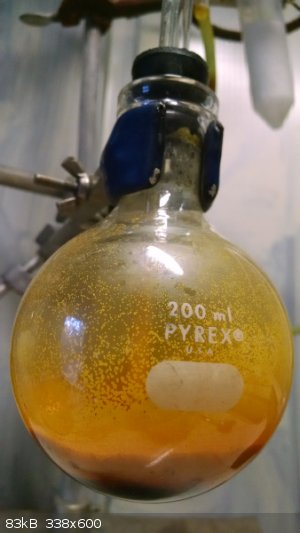 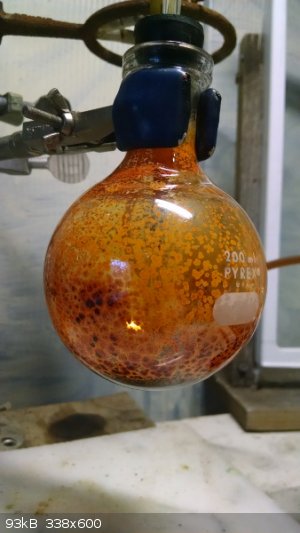 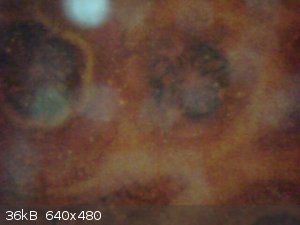
al-khemie is not a terrorist organization
"Chemicals, chemicals... I need chemicals!" - George Hayduke
"Wubbalubba dub-dub!" - Rick Sanchez
|
|
|
alexleyenda
Hazard to Others
  
Posts: 277
Registered: 17-12-2013
Location: Québec, Canada
Member Is Offline
Mood: Busy studying chemistry at the University
|
|
[Et4N]3[Fe(SCN)6] complex I made today. The cristals are a very very dark green and when you crush them they become Red, which is a very rare thing.
It has something to do with a difference in energy depending on the size of the cristals, I didn't look in details for the explaination, i,m very
tired from my day. Anyway, enjoy :p
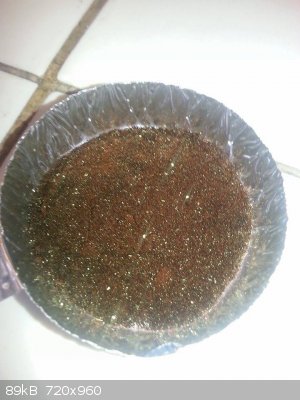 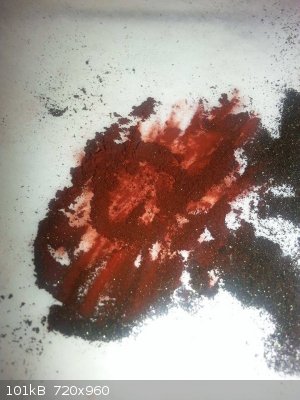
Help us build the Sciencemadness Wiki! Every question and tips about amateur chemistry two clicks away, wouldn't that be awesome?!
sciencemadness.org/smwiki
|
|
|
fluorescence
Hazard to Others
  
Posts: 285
Registered: 11-11-2013
Member Is Offline
Mood: So cold outside
|
|
Wow that looks interesting. I didn't know that property even existed.
Edit: Just tried that compound suggested in this thread
http://www.sciencemadness.org/talk/viewthread.php?tid=48176
After 5 min of gently heating and then letting it cool for about 10 min. I got that. Pretty satisfying how easy that went and how good the result
looks.
All credits go to woelen who presented that compound first !

[Edited on 13-2-2015 by fluorescence]
|
|
|
The Volatile Chemist
International Hazard
    
Posts: 1981
Registered: 22-3-2014
Location: 'Stil' in the lab...
Member Is Offline
Mood: Copious
|
|
Nice pictures! Could the crystals of the "[Et4N]3[Fe(SCN)6]" complex you made have oxidized? does the crushed powder show any signs of change? If not,
that's amazing!
|
|
|
alexleyenda
Hazard to Others
  
Posts: 277
Registered: 17-12-2013
Location: Québec, Canada
Member Is Offline
Mood: Busy studying chemistry at the University
|
|
The color change happens at the second you crush the crystals and no sign of oxidation is present. I'm gonna try to find an explanation.
Edit: I've done some research and nothing, I've only seen the compound and this property listed in an article from 2013, but no explanation. It seems
it's a quite rare phenomenon and it hasn't been investigated much yet.
[Edited on 13-2-2015 by alexleyenda]
Help us build the Sciencemadness Wiki! Every question and tips about amateur chemistry two clicks away, wouldn't that be awesome?!
sciencemadness.org/smwiki
|
|
|
Zombie
Forum Hillbilly
    
Posts: 1700
Registered: 13-1-2015
Location: Florida PanHandle
Member Is Offline
Mood: I just don't know...
|
|
I'm just going to make a simplified guess, and say it is a property of light diffraction in the crystalline structure vs the crushed state'.
Similar to lead crystal vs crushed.
With no oxidation or further interaction of compounds I don't see any other viable explanation.
[Edited on 14-2-2015 by Zombie]
They tried to have me "put to sleep" so I came back to return the favor.
Zom.
|
|
|
woelen
Super Administrator
        
Posts: 8082
Registered: 20-8-2005
Location: Netherlands
Member Is Offline
Mood: interested
|
|
I have been playing around with my PBr3 which I made a few years ago, see http://www.sciencemadness.org/talk/viewthread.php?tid=17228#... .
I have made nice collector's samples of some very rare compounds:
PBr3: http://woelen.homescience.net/science/chem/compounds/phospho...
PBr5: http://woelen.homescience.net/science/chem/compounds/phospho...
PBr7: http://woelen.homescience.net/science/chem/compounds/phospho...
Some time ago, I also added 200 mg of C60 (fullerene) to my element collection. I put some CS2 and C60 in an ampoule and keep this as another sample
for my collection of compounds:
C60: http://woelen.homescience.net/science/chem/compounds/carbon....
|
|
|
Texium
Administrator
       
Posts: 4667
Registered: 11-1-2014
Location: Salt Lake City
Member Is Offline
Mood: Preparing to defend myself (academically)
|
|
Wow, great pictures as usual, woelen. I would have never expected that fullerenes would even dissolve, much less make such colorful solutions! Really
fascinating stuff.
|
|
|
Mailinmypocket
International Hazard
    
Posts: 1351
Registered: 12-5-2011
Member Is Offline
Mood: No Mood
|
|
That C60 is beautiful Woelens! I'm going to try and see what those nanotubes I got as samples recently look like in CS2 also, I wonder if the color
will be similar or none at all? Haven't researched much but Wikipedia (not the best source) does indicate some sort of solubility.
Note to self: Tare the damned flask.
|
|
|
The Volatile Chemist
International Hazard
    
Posts: 1981
Registered: 22-3-2014
Location: 'Stil' in the lab...
Member Is Offline
Mood: Copious
|
|
Where did you purchase the fullerenes? Good price tags on 'em.
|
|
|
Hegi
Hazard to Others
  
Posts: 199
Registered: 27-9-2013
Member Is Offline
Mood: No idea.
|
|
Potassium hexacyanochromate
Hello everyone,
if someone´s interested in chromium compounds there is one that is really hard to get in its pure form. Yields up to 10%. You can find the whole
synthesis here -> K3[Cr(CN)6]
<img src="http://chem.pieceofscience.com/wp-content/uploads/2015/01/hexacyanochromate.jpg" width="900" height="600" alt="Computer Hope">
<img src="http://chem.pieceofscience.com/wp-content/uploads/2014/01/hexacyanidochromate-II.jpg" width="900" height="600" alt="Computer Hope">
Our webpage has been shut down forever cause nobody was willing to contribute. Shame on you all!!!
|
|
|
Zombie
Forum Hillbilly
    
Posts: 1700
Registered: 13-1-2015
Location: Florida PanHandle
Member Is Offline
Mood: I just don't know...
|
|
Lovely Picts. and write up.
They tried to have me "put to sleep" so I came back to return the favor.
Zom.
|
|
|
The Volatile Chemist
International Hazard
    
Posts: 1981
Registered: 22-3-2014
Location: 'Stil' in the lab...
Member Is Offline
Mood: Copious
|
|
I bet they would (The Cr(III) and Co(III) complexes mentioned here and on his site, respectively) would make great indicators for metal ions, and
selective precipitation salts.
|
|
|
alexleyenda
Hazard to Others
  
Posts: 277
Registered: 17-12-2013
Location: Québec, Canada
Member Is Offline
Mood: Busy studying chemistry at the University
|
|
A little classic :p I managed to get my hands on AgNO3 for the first time 

Help us build the Sciencemadness Wiki! Every question and tips about amateur chemistry two clicks away, wouldn't that be awesome?!
sciencemadness.org/smwiki
|
|
|
Zombie
Forum Hillbilly
    
Posts: 1700
Registered: 13-1-2015
Location: Florida PanHandle
Member Is Offline
Mood: I just don't know...
|
|
Is that the one they call the silver tree?
How fragile is that? Dust? Powder?
They tried to have me "put to sleep" so I came back to return the favor.
Zom.
|
|
|
| Pages:
1
..
26
27
28
29
30
..
77 |